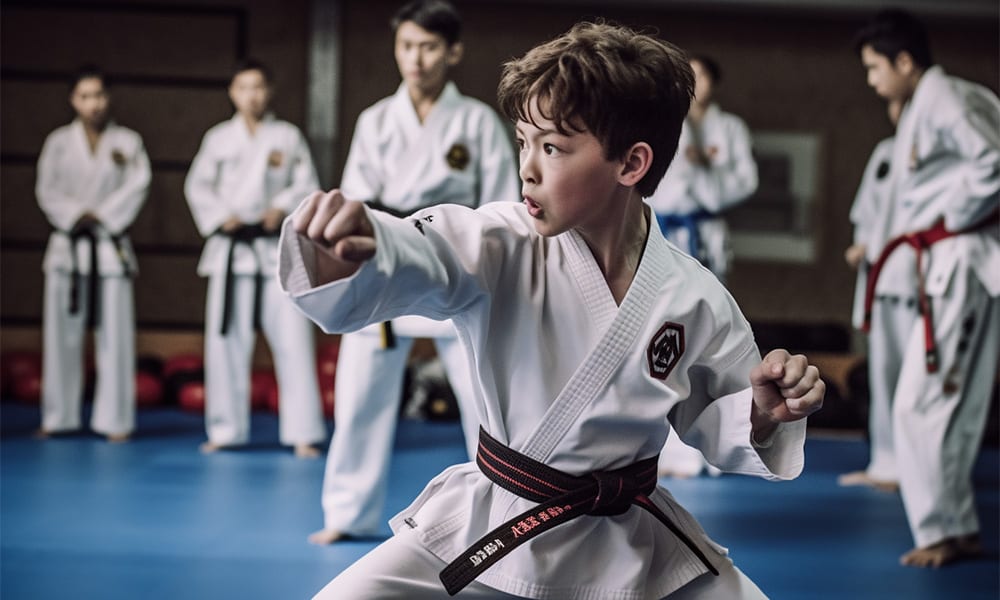
As a long time student of Taekwondo, I have witnessed firsthand the transformative power this martial art holds. Taekwondo is not just about physical prowess and self-defense; it is a discipline that fosters mental and emotional well-being, instills confidence, and promotes personal growth.
In this blog post, I will explore how Taekwondo can positively impact individuals with disabilities. Through its principles of adaptability, inclusivity, and resilience, Taekwondo offers a unique avenue for people with disabilities to embrace their full potential and lead empowered lives.
Enhancing Physical Fitness and Motor Skills
One of the key aspects of Taekwondo training is its adaptability. Regardless of the nature of a person’s disability, Taekwondo instructors are skilled at modifying techniques and exercises to accommodate individual needs.
Whether it’s adjusting the height of targets for kicks or finding alternative methods for executing certain movements, Taekwondo ensures that individuals with disabilities can actively participate and progress in their training.
Through consistent practice, Taekwondo helps individuals with disabilities improve their strength, balance, coordination, and flexibility. The various training routines and techniques involved in Taekwondo work together to challenge and develop different muscle groups throughout the body.
Kicks, punches, blocks, and stances all contribute to strengthening the core, legs, and upper body, leading to improved physical fitness and overall strength.
In addition to building strength, Taekwondo enhances balance and coordination. These skills are particularly important for individuals with disabilities as they directly impact mobility and stability. Through repetitive practice of kicks and stances, individuals with disabilities gradually develop a greater sense of body awareness and control.
Taekwondo also emphasizes precise footwork, which further enhances coordination and balance. These improvements in balance and coordination contribute to better motor skills and overall physical functioning.
One of the remarkable aspects of Taekwondo is its focus on flexibility. Regardless of a person’s disability, Taekwondo training includes stretching exercises that gradually improve flexibility over time. Increased flexibility not only enhances performance in Taekwondo techniques but also has numerous benefits for daily life.
Improved flexibility can aid in maintaining proper posture, preventing muscle imbalances, and reducing the risk of injuries. For individuals with disabilities, who may face unique challenges related to flexibility, Taekwondo offers a structured and supportive environment to work on increasing range of motion and overall flexibility.
Taekwondo’s emphasis on physical fitness and motor skills is not limited to specific disabilities. Whether an individual has a physical impairment, sensory disability, or a cognitive limitation, Taekwondo can be adapted to suit their needs and abilities.
In fact, Taekwondo can be particularly beneficial for individuals with conditions such as cerebral palsy, spina bifida, or visual impairments, as it provides an opportunity to engage in physical activity, improve motor skills, and experience the joy of movement.
Promoting Mental Resilience and Emotional Well-being
One of the core principles of Taekwondo is the cultivation of discipline and self-control. These qualities are particularly valuable for individuals with disabilities, as they face unique challenges in their daily lives.
Through the practice of Taekwondo, individuals learn to set goals, follow a structured training regimen, and maintain focus and concentration. This discipline extends beyond the training mat and can positively impact other areas of life, such as academics, work, and personal relationships.
Taekwondo also promotes mental resilience by teaching individuals to embrace challenges and overcome obstacles. In the process of learning new techniques and participating in sparring sessions, individuals with disabilities gradually develop a growth mindset and the belief that they can overcome difficulties.
Taekwondo fosters a supportive and encouraging environment, where individuals are motivated to push their limits and persist in the face of adversity. This resilience cultivated through Taekwondo training can translate into improved coping skills and the ability to face and overcome challenges in various aspects of life.
In addition to discipline and resilience, Taekwondo helps individuals with disabilities develop self-confidence and self-esteem. As individuals progress in their training and witness their own growth and achievements, they gain a sense of pride and belief in their abilities.
Taekwondo provides a platform for individuals to showcase their skills and talents, boosting their self-confidence and enhancing their self-image. This newfound confidence can have a transformative effect, empowering individuals to pursue their goals and dreams with a renewed sense of self-assurance.
Taekwondo also serves as a valuable outlet for managing stress and emotions. The practice of martial arts involves rigorous physical activity, which releases endorphins and promotes a sense of well-being. Engaging in regular Taekwondo training can help individuals with disabilities reduce stress, alleviate anxiety, and improve overall emotional well-being.
The focus required during training sessions allows individuals to temporarily shift their attention away from daily challenges and immerse themselves in the present moment, promoting mindfulness and mental relaxation.
Furthermore, Taekwondo fosters a sense of community and social connection. Individuals with disabilities often face social isolation and feelings of loneliness. Taekwondo provides an inclusive and supportive environment where individuals can connect with like-minded individuals, form friendships, and feel a sense of belonging.
The camaraderie among practitioners creates a strong support system that uplifts and encourages each other, fostering positive social interactions and emotional well-being.
Final Thoughts
Taekwondo has the remarkable ability to empower individuals with disabilities, transcending physical and societal barriers. Through its emphasis on adaptability, inclusivity, and resilience, Taekwondo creates an environment where individuals can discover their true potential, develop physical fitness and motor skills, build self-confidence and self-esteem, and foster mental resilience and emotional well-being.
It is crucial to recognize and support the inclusion of people with disabilities in Taekwondo programs, ensuring that they have equal opportunities to benefit from this life-transforming martial art. Let us embrace the power of Taekwondo to empower abilities, enrich lives, and create a more inclusive and compassionate society.

